Wednesday, May 24, 2006
Friday, May 19, 2006
Red Carpet Day at the Lieutenant
 This is too funny. The publicist involved is either brilliantly, savagely ironic, or hopelessly oblivious.
This is too funny. The publicist involved is either brilliantly, savagely ironic, or hopelessly oblivious.
Here’s a sampling of quotes from reviews of Martin McDonagh’s The Lieutenant of Inishmore”. “Blood winds up on almost every surface,” says The New York Times. “The blood-soaked events…make Sweeney Todd look like a stroll down Park Lane,” says CurtainUp. “I have never seen so much blood onstage,” says another. Pretty much every critic that has reviewed the play has resorted to use of the term “bloodbath”.
And what’s happening at the theatre where it’s running next Tuesday? A blood drive for the New York Blood Centre. Apparently this centre’s mission is to collect 2000 volunteer blood donations a day to support transfusion needs in close to 200 NY and Jersey hospitals. Have they thought about just putting a couple of bowls under the stage for the rest of the Lieutenant run?!
There’ll be free tickets to the play for the first 50 donors. If only my blood was pure….
Posted by
hesitant hack
at
1:26 PM
35
comments
![]()
Thursday, May 18, 2006
Still Safer than an Irish School Bus

A new advertising campaign in Manhattan - two of these buses will drive around the streets for 2 weeks and then one bottle of detergent for each bus will wash every scrap of clothes clean. Nobody seems to have any idea what the detergent is, so hardly a super-successful stunt so far.
It reminded me of childhood TV when I looked at it first (why am I thinking about TV so much today? Is this a craving? Am I pregnant? With a couch potato?) and I couldn't work out why. Then I got it.
This bus: the lovechild of Wanderly Wagon and Fortycoats.
Posted by
hesitant hack
at
2:52 PM
0
comments
![]()
Labels: New York
Thanks, Mum. You can stop now.
Regular readers may have noticed that I've been getting a higher proportion of comments than usual over the last few days. In fact, they all arrived at exactly the same time, on Monday night, which made me very excited indeed until I opened them and found that they were all from the same anonymous android source (actually, as stellanova will understand, they read like they were all written by Lucy Camden) and all saying very kind things in very bad English. About the superb super beauty of my "graphic", etc, and about how the commenter has "ever seen such beautiful colors". I wish I could believe you, anonymous. But I can't. Your reaching my blog was probably the prelude to hacking into my whole life, and you are probably this minute looking with disgust at the meagre amount in my bank account and wishing that you'd hacked into someone else's blog instead, like this ditzfest..
Anyway, the upshot of this is that my zillions of commenters will have to do that annoying word verification thingy from now on. Sorry!
Posted by
hesitant hack
at
1:22 PM
3
comments
![]()
Spoilsport

Now, because I don't have a television anymore because I have So Much Work To Do*, I no longer get to enjoy one of the great treats of my vacuous life, namely watching double-bills of The O.C. and pretending that I am seventeen and going out with Seth Cohen (that Seth Cohen, in real life, is actually the same age as me, makes the pain all the greater. Sudden thought: would Seth Cohen write letters about poetry criticism to the Orange County Times? Hmmm...)
Anyway. Now, I know that most of my readers are WAY too sophisticated ever to care about future plot developments in the O.C., but I also know that I have a little lurker out there who might be very interested in certain things, such as WHO IS GOING TO DIE, ahahahahahaharrrrrr. As well as 16th century Connaught and Johnny Logan retrospectives and things like that. Now, because I'm so nice, I am going to put the spoiler in this this link, so you don't have to read it if you don't want to. But you do, don't you?
*however, having always-on wireless internet access does tend to defeat that noble gesture of self-punishment...if Matt Talbot had had access to google, how different things might have been...
Posted by
hesitant hack
at
10:57 AM
2
comments
![]()
Tuesday, May 16, 2006
New-Fangled Train
 To the lazy Irish train drivers, (try working in tunnels a mile under the Hudson river, with rats the size of badgers, like the MTA guys here, and then you’ll have reason to strike), I have only this to say: if John Kelly's Mystery Train can deal with the 21st Century without giving up on the job, so can you.
To the lazy Irish train drivers, (try working in tunnels a mile under the Hudson river, with rats the size of badgers, like the MTA guys here, and then you’ll have reason to strike), I have only this to say: if John Kelly's Mystery Train can deal with the 21st Century without giving up on the job, so can you.
Listen: The Mystery Train 11.05.06: Nothing Before the Year 2000
Posted by
hesitant hack
at
9:10 AM
0
comments
![]()
Tony Nominations In

The Tony Nominations for this year have just been announced, and all three Irish plays on Broadway at the moment are in with a shot.
Shining City and The Lieutenant of Inishmore are both nominated for Best Play, along with Rabbit Hole and The History Boys; no nod here for Faith Healer, though it’s well represented in other categories. Overall, Lieutenant comes out with the most nominations. Here’s the Irish rollcall:
Faith Healer:
Best Revival of a Play
Best Performance by a Leading Actor (Fiennes)
Best Performance by a Featured Actor (McDiarmid)
Best Lighting Design (Mark Henderson)
Shining City:
Best Play
Best Performance by a Leading Actor (Platt)
Lieutenant of Inishmore:
Best Play
Best Performance by a Leading Actor (D Wilmot)
Best Performance by a Featured Actor (D Gleeson)
Best Performance by a Featured Actress (A Pill)
Best Direction of a Play (Wilson Milam)
I can’t believe that Threepenny Opera has been nominated at all (Best Revival of a Musical, Best Performance by a Featured Actor for Jim Dale). I thought it was a truly horrific production. There was no life at all onstage.
Posted by
hesitant hack
at
8:53 AM
0
comments
![]()
Monday, May 15, 2006
Unblogged But Not Forgotten

After the jump (thank you, Gawker), some rapid-fire accounts of things I should have blogged over the last three weeks but didn't. 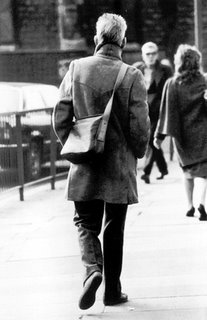 1.Semi-stalker of Beckett takes a handful of good photographs and dines out on them for the rest of his life.
1.Semi-stalker of Beckett takes a handful of good photographs and dines out on them for the rest of his life.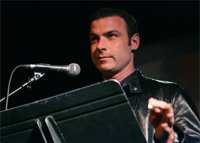 2. Because the list of authors to be read from sounded so good, we went to this event without even checking out the list of readers. A pleasant surprise – and Rushdie made a guest appearance, to read from Milosz’s poems. Excellent. Listen here.
2. Because the list of authors to be read from sounded so good, we went to this event without even checking out the list of readers. A pleasant surprise – and Rushdie made a guest appearance, to read from Milosz’s poems. Excellent. Listen here. 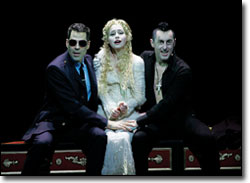 3. Broadway No. 1: unmitigated tripe, from beginning to end. Or rather, from beginning to interval, when we left in shock. Nellie McKay can sing, but she cannot act.
3. Broadway No. 1: unmitigated tripe, from beginning to end. Or rather, from beginning to interval, when we left in shock. Nellie McKay can sing, but she cannot act.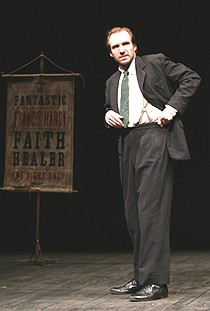 4. Broadway No. 2: overblown, but still compelling. Fiennes twitches with uncertainty, Jones trips into melodrama, and McDiarmid, the comic turn, steals the limelight in a tragedy. But there’s no doubting the strength of Friel’s words. And most importantly, of course, a great after-party...
4. Broadway No. 2: overblown, but still compelling. Fiennes twitches with uncertainty, Jones trips into melodrama, and McDiarmid, the comic turn, steals the limelight in a tragedy. But there’s no doubting the strength of Friel’s words. And most importantly, of course, a great after-party...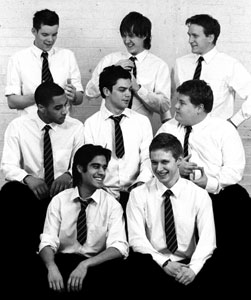 5. Broadway No. 3: unchallenging, but brilliantly written. Irritating use of film clips, but superb use of Richard Griffiths. Richard Griffiths? Monty, you terrible c***!
5. Broadway No. 3: unchallenging, but brilliantly written. Irritating use of film clips, but superb use of Richard Griffiths. Richard Griffiths? Monty, you terrible c***!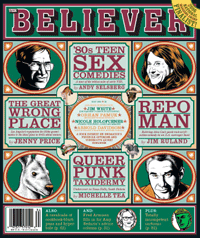 6. Clever people being ironic about cleverness. Great. For about two minutes. Listen here.
6. Clever people being ironic about cleverness. Great. For about two minutes. Listen here.
7. We went to this to hear Kinnell and Williams, knowing nothing about Paul Zweig. He died 22 years ago. Williams read one of the most perfect elegies I’ve ever heard.  8. Taking over a vast warehouse in DUMBO, this year’s crop of visual arts graduates from the MFA programme. Worth it: Gary Hadad’s photographs, Yasue Maetake’s performance art (videoed), Qing Liu’s installation. The rest: meh, as they say in livejournal parts.
8. Taking over a vast warehouse in DUMBO, this year’s crop of visual arts graduates from the MFA programme. Worth it: Gary Hadad’s photographs, Yasue Maetake’s performance art (videoed), Qing Liu’s installation. The rest: meh, as they say in livejournal parts. 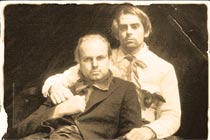 9. This is perhaps the best piece of theatre I’ve seen all year. And it isn’t even finished yet; this was a workshop performance, for which hey only had something like three weeks of rehearsal. It looked near-perfect to me. Sabooge rock. They’ll bring this to the Dublin Fringe before it returns here, to PS 122. Wherever you are, go.
9. This is perhaps the best piece of theatre I’ve seen all year. And it isn’t even finished yet; this was a workshop performance, for which hey only had something like three weeks of rehearsal. It looked near-perfect to me. Sabooge rock. They’ll bring this to the Dublin Fringe before it returns here, to PS 122. Wherever you are, go.  10. Films recently caught on DVD and in the cinema:
10. Films recently caught on DVD and in the cinema:
(a) One insult after another. Unbelivably bad.
(b) Terrific. But isn't there some horrible irony to Ryan Tubridy's liking it?
(c) One insult after another. Unbelivably bad. (This was my second time to see this film. It gets worse with each viewing).
(d) A great new film from Terry Zwigoff. Genuinely funny and brilliantly strange. And yes miglior, yum. That’s Anthony Minghella’s son, by the way.
Posted by
hesitant hack
at
2:28 PM
10
comments
![]()
Labels: New York
On Pints and Ponchos: Shining City in the New York Press
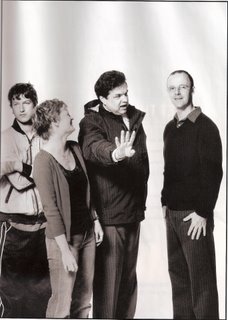
There’s an odd interview with Conor McPherson in Sunday’s New York Times. Or maybe it’s not odd, and it’s just that the American approach to interviewing is very different. McPherson flew to New York early so that he could give this interview, yet the writer, Jason Zinoman, quotes him only a handful of times (eight short quotes in a 1200 word pieces), opting instead to ruminate at length about the playwright’s near-fatal battle with alcoholism (he collapsed at the opening of Port Authority in 2001, and was subsequently unconscious for three weeks with a dangerously inflamed pancreas), and about the place of alcohol in his plays. I’m not saying that this isn’t interesting, and McPherson is willing to talk openly about it, but it’s such a bloody predictable approach. Finishing up, of course, with the obligatory meditation on the centrality of drink in Irish culture. Again, I’m not saying this shouldn’t be there, but there was room in a piece of this length to explore, in more depth, other aspects of McPherson’s playwriting practice and of the creation of Shining City. Like, for example, the fact that it came largely out of his own experience in therapy following his breakdown. There’s a mention of how dysfunctional and crazy therapists are, but I would have liked to read a little more about the creation of a play out of that situation. Also, is it just me or is there something drearily voyeuristic about the way that Zinoman goes to Neil Jordan for a quote about how drunk McPherson used to get and how much he used to drink by himself? And getting the “things are better now” quote from McPherson’s wife; if the rest of the interview was sufficiently probing and revealing of its subject, this sort of padding would not be needed, because the reader would know that McPherson drank too much, and that he’s more balanced and happy now. In fact, the little that Zinoman gives us of McPherson’s own words already shows this, so why the other quotes? I think it’s mere gimmickry. John Lahr of the New Yorker often talks to the family and friends of his subjects when he’s writing his long profiles, but there’s never a sense of redundancy or of going over already-covered ground with those quotes. Everything has its place, and what’s built up as a result is a full and far-reaching portrait. I think the NYT has merely glossed over McPherson. He’s been sober for 5 years, so why a whole article about his drinking? (Not to mention his “kinky red hair”…spare us.)
Speaking of the New Yorker, Hilton Als gives Shining City a pretty brisk seeing-to in his review. It’s not entirely at the other end of the spectrum to Ben Brantley’s NYT gushfest, (“in terms of construction…as close to perfection as contemporary playwriting gets”) but it’s certainly not a glowing response. Why he feels the need to devote a long paragraph at the beginning of the review to an utterly unrelated actor and director, Charles Laughton - best known as Quasimodo in the 1939 film The Hunchback of Notre Dame – absolutely baffles me; if he wanted to discuss Oliver Platt’s distinctive “way of moving through space”, why not get straight to it? (I’m not convinced that Platt was that comfortable in the role anyway; I think his onstage awkwardness might have stemmed from a genuine discomfort with the role of an Irishman.)
Als praises all four actors, and his point that listening, much of which is required of this cast, is one of the hardest things for an actor to perform, is a very good one. But I can’t agree with his argument that O’Byrne’s role is technically the most difficult because he must “hold up a mirror to two confused souls without conveying his own character’s confusion in their presence.” Our gradual realisation of Ian’s confusion and internal chaos is essential, and O’Byrne must guide us towards that realisation in the scenes he shares with the other actors. Which I think he does without difficulty, yet Als maintains that he (Als) didn’t intuit that confusion until near the end. Maybe he was too distracted by Platt’s “poncho” (it’s a windcheater, for Christ’s sake…)?! Oh, ok, that’s just petty. I usually like Als’s criticism a lot, and I agree with his final analysis of the play, that it comes across “as an undeveloped first draft”. And I agree that the actors, most of them, turn in strong performances, but I see their strengths in different places. I certainly can’t share Als’s adoration of Oliver Platt, and I think that Peter Scanavino deserved more credit than he was given in this review (in fact, he was not even mentioned…was his accent too strong?) Great photo, though, by Steve Pyke (above).
Posted by
hesitant hack
at
2:14 PM
4
comments
![]()
The Danielson Familie at Northsix

On Saturday night, we went to another sold-out event, the launch at Northsix in Williamsburg of Ships, the new album from the avant-gospel sibling band, Danielson. I was a Danielson virgin, but not no more, Lord. Clad in absurd boy-scout-like uniforms, complete with berets and badges, the nine-piece band screeched and trilled and blasted their way through the sort of Christian performance art/improv/noise that has to be heard to be believed.*
So hear it: here (scroll down the list to nos. 17 - 21) and here.
*Sample lyrics: 'We are all seeds to meet these needs (tend this garden, shut up these weeds! Shut down these weeds! Weed me please...hush, hush" ( We Don't Say Shut Up) and "the rubbernecker ain't no lover / he's a wrecker / of the family of ties / now a word for his wives" (The Cutest Little Dragon)
Posted by
hesitant hack
at
12:35 PM
10
comments
![]()
Labels: New York
Awkward Silence at MOMA
 On Friday evening, we were hugely disappointed to turn up at MOMA for the screening of short films by Beckett, Genet and Ionesco only to find that it was sold out (never mind the fact that it had been advertised as a free event, and that there was now a $10 admission fee). I had been looking forward to the public conversation of Barney Rosset and James Fotopoulos. Fotopoulos is the young filmmaker who's made a short inspired partly by Beckett's 1947 play Eleuthéria, which I'm also trying to write something about at the moment.
On Friday evening, we were hugely disappointed to turn up at MOMA for the screening of short films by Beckett, Genet and Ionesco only to find that it was sold out (never mind the fact that it had been advertised as a free event, and that there was now a $10 admission fee). I had been looking forward to the public conversation of Barney Rosset and James Fotopoulos. Fotopoulos is the young filmmaker who's made a short inspired partly by Beckett's 1947 play Eleuthéria, which I'm also trying to write something about at the moment.
Anyway, we couldn't get in - despite the fact that I'd been sent (and had replied to) a press invite, grrr - and nor could any of the 30-plus people who were also astonished to see that the event had been sold out so quickly. It wasn't exactly the kind of thing with which you associate an immediate sell-out - a screening of Beckett's 1964 silent film Film, followed by outtakes from the shoot and a live commentary by Rosset. Then Jean Genet's Un Chant d'amour, a 26 minute silent work from 1950, and finally a new film production of Ionesco's screenplay The Hard-Boiled Egg, commissioned by Rosset from Fotopoulos. All the films were produced by Rosset's company Grove, which was also the publisher responsible for bringing the work of Beckett, Ionesco, Pinter, Duras, and countless others to America for the first time (and for fighting censorship battles on behalf of many of these authors). Anyway, we couldn't get in on Friday, so it was back to Brooklyn and pints in Spike Hill (a non-cheesy Irish bar) for us. But we managed to get tickets for the following day's screening, so along we went. By then it had sold out too.
And by approximately 30 seconds into the first screening, of Film, I was even more baffled as to why. A huge part of the audience was made up of older people, as in old people, and when confronted with the silence and unconventional approach to narrative of Beckett's film (it features a shrouded Buster Keaton, in his last role and scarcely showing his face, scurrying from a street to an apartment, and trying desperately not to glimpse his own reflection), many of them reacted as though they'd been locked in a burning barn. There were coughs, snuffles, scuffles, outright exclamations of disbelief and dismay, constant hissings about whether the sound was broken, and loud exits. During the outtakes, which weren't as interesting as they could have been - mainly the same scene shown over and over - there were audible groans. But things got funnier still with the Genet and the Ionesco films. The Genet was luxuriantly homoerotic, set in a prison where the beefy young inmates couldn't keep their eyes off each other and their hands out of their pants. By the climactic scene of full-frontal orgy, the seats were flying up so fast that it sounded like a duck shoot. Respectable couples were running out of there as fast as their arthritis could carry them, and the poor security guard at the door got an earful from one man who thought that the film should have come clearly marked "PORN". It wasn't a great film but this experience was priceless. Next came the utter bizarreness of Fotopoulos's version of Ionesco, which I thought pretty shallow and pretentious, but it, too, provided its share of hilarity. One man burst from his seat almost wailing "I gotta get out of here". 
At the end of the screening, the cinema was more than half-empty, and you had to wonder what the hell these people thought they were coming to see. Most of them seemed genuinely shocked, yet the programme had been quite clearly explained. Maybe the answer was provided by the old dear who came in late and sat beside A (the cinema was so full we couldn't get seats together). At the end of it all, she turned to him and asked where the Buster Keaton movie had been. She loved Buster Keaton, she said, and she came to see him. Had she missed something? And what was all that terribly boring stuff where Buster should have been?
Posted by
hesitant hack
at
11:44 AM
5
comments
![]()
Labels: New York
Friday, May 12, 2006
Popbitch at 300
 Popbitch, the gossip/satire newsletter, has published its 300th issue this week. It’s always of pretty mixed quality –after a certain point, every Lib Dem brothel scene reads the same way. But there have been some painfully funny moments over the past few years. The current newsletter is a compilation of readers’ favourites, including the gems below...
Popbitch, the gossip/satire newsletter, has published its 300th issue this week. It’s always of pretty mixed quality –after a certain point, every Lib Dem brothel scene reads the same way. But there have been some painfully funny moments over the past few years. The current newsletter is a compilation of readers’ favourites, including the gems below...
Btw: the Irish singer is just in there because I want to know who he is!! Any ideas? Don't know if, by 'old', they mean Sonny Knowles-old or Chris de Burgh-old. Unfortunately, it's definitely a man, which rules Margo and Philomena Begley out straightaway. Pity. An Australian man was driving down the freeway when he noticed the woman in the car beside him waving. When they pulled up at the lights he wound down the window. "I've just bought the new Coldplay album",she said. "Do you want it? It's crap!" The man said yes, and she chucked the CD through the open car window. At that point he realised it was Muriel's Wedding star Toni Collette.
Which popstar, egged on by Stella McCartney, "accidentally" stubbed her cigarette out on Heather Mills' wooden foot at her and Macca's wedding?
On a fashion shoot in a derelict house, Kate Moss wanted to take a pee.
Assistant: "Well, there is a loo, but there's no door on it".
Kate: "Well how the fuck do I get in there then?"Which old Irish singer spends evenings on tour with "the United Nations"? This is his code to the tour manager for three prostitutes: one white, one black, one Asian.
and finally...my personal favourite...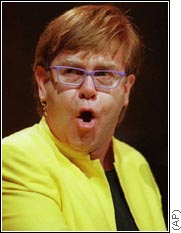
Britain's papers have been full of the sad tale of a mother who murdered her Down's Syndrome son, after caring for him full-time for 36 years. So what was the final straw for the exasperated mother?
"Patrick had spent the entire day listening to the same Elton John CD, shouting the word 'Elton' repeatedly."
Posted by
hesitant hack
at
1:50 PM
10
comments
![]()
Wednesday, May 10, 2006
Breaking: Brangelina Anti-Landmine Campaign Assumes Tragic Personal Resonances

And the worst of it is, that was the leg containing his last remaining sensitivity chip.
(I was meant to spend today writing. Wouldn't you know...)
Posted by
hesitant hack
at
4:08 PM
4
comments
![]()
Gawking with an Irish Accent
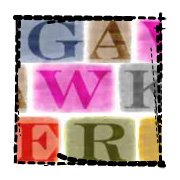
It’s brooding Irish actor day on Gawker Stalker today, with Jonathan Rhys Myers bitching about Colin Farrell’s bitching about Irish women not being sufficiently familiar with waxing salons, and Gabriel Byrne making himself late for wherever he was going by having long conversations with the friend of some blogger no-one has ever heard of (why wasn’t he at the opening night of Shining City? Was he trying to get a cab to the after-party so that he could pretend to have been there all along, a la Faith Healer last week?) And to top it all off, there’s a girlie-pink banner ad for Marian Keyes’ latest novel flickering along the top of the page. Ah, how proud I am.
Gawker Stalker is a funny old game; there’s now an accompanying, real-time map, so that anyone who finds themselves near the site of a celebrity spotting in the moments after it’s posted can dash downstairs and into the relevant park or café to see if their idol is still there. It’s done in savage irony, as much of Gawker’s content is, but also like much of Gawker’s content (especially now that the site is taking in millions of dollars in advertising revenue) it also, conveniently, panders to that very perfunctory, lowest-common-denominator, Us or People-esque appetite for more and more celebrity sightings. And the sightings are so mundane - both in terms of the calibre of the "celebrities" spotted (not just the B-listers or the famous-fifteen-years-ago people, but the NY bloggers and media types about whom nobody outside their cock-ring-narrow circles are interested) and in terms of the normality of the things they're spotted doing - buying a coffee, walking a baby, crossing a street, hailing a cab. It's pathetic, but strangely addictive. The map, however, is too much like hard work for my liking. I find it hard enough to work out whether the 4 train goes to Times Square or Grand Central, the N to Canal or Chambers. I'm not going to dizzy myself further by trying to work out which end of the park Scarlett Johansson is walking her dogs at (note to disbelieving boyfriend: no, really! Well, ok...maybe a little map-frowning. But not for Matt bloody Dillon. There's time-wasting, and then there's MORTAL SIN).
Celebrity is such a strange phenomenon in this city. It’s hard not to get sucked in, at least to some degree; hard not to gawk. But what was most strange, or maybe sobering, at the opening night of Shining City on Broadway last night, was to see how quietly and in how unnoticed a fashion Conor McPherson and his wife came into the theatre and took their seats while, around them, the celebrities in attendance (namedrop time? Ok…some Sopranos people, including Edie Falco; Eric McCormack from Will & Grace; Brian Dennehy; Mario Batali the swanky NY chef, and many other bit-parters, most of them probably from Law and Order, which seems to supply the default celeb audience at Broadway openings) were grinning and gurning and posing and preening like the full-on publicity factories that they are. All getting the maximum possible mileage out of being there, and all, no doubt, feigning terrific interest in the play they were about to see, and none of them having the slightest notion that the slight, red-haired young man moving through them was the playwright, and hardly caring less. Camera bulbs flashing, air kisses flying, Stella McCartney frocks swishing, disinterested glances darting; it’s a really surreal, artificial atmosphere. And of course every other seat was taken up by mothballed Patrons, skin freshly tightened and Chanel boucle freshly updated for the new season. While, sitting with his back to the frenzy at the entrance, waiting to see what would become of his words this time, was the artist.Now, that said, McPherson is very laid-back (not to mention a very nice guy), and far from a shrinking violet – he seemed pretty much at ease both before the performance and at the party afterwards, where he gave a warm and funny speech, straight off the cuff. It just looks agonizing, though, the whole process. I mean, I've withdrawn all my plays from Broadway as a result...
The production was better than I expected, and the response was good, though as usual at this sort of opening, when most of the audience are there to be seen rather than to see, the atmosphere was strained, people not hesitating to cough and shuffle and sigh when their ankle-high boredom thresholds were reached, and I felt a definite bristling among the older members of the audience, the men especially, when the nature of the scene with the character of the rent-boy (played with damn-near-perfect Dublin Scangerese by Peter Scanavino) became clear. The play’s not perfect, and there is the sense at many points of the writing straining towards something that it hasn’t yet discovered or articulated (the inarticulateness of Brian F O’Byrne’s performance as the priest-turned-shrink Ian was another matter; that was carefully and artfully designed, and O’Byrne carried it off extremely well). As Neasa, Martha Plimpton is strong, and again, her Irish accent is really well observed, but Oliver Platt was hard to buy, at most points, as Ian’s wife-haunted patient John. There’s also an uneasiness to the shape of the play which may come, I suspect, of the playwright having arrived at his central theme or idea before finishing the writing of the play, rather than letting it emerge through the writing. Once that happens, it’s a difficult situation to resolve, and the resultant uncertainty does pervade the production, absorbing as it is. And the ending…well, I actually liked it. I mean, it’s very rash and bizarre, but I found it thrilling rather than ludicrous, and I got such a sadistic kick out of all those Park Avenue poodles gasping and shuddering as they doubted the evidence of their own eyes. Apparently there were real, blood-curdling, coronary-inducing screams of terror at the previews. Now that I would have liked to hear.
Posted by
hesitant hack
at
11:20 AM
4
comments
![]()
Labels: New York
Tuesday, May 09, 2006
Morning Caller

I am such an idiot. This morning, while I sat in my usual foggy-headed stupor in front of my laptop (if I fall into the trap of logging on as soon as I get out of bed, that's the whole day shot to pieces), the doorbell rang. Usually, this means that the UPS guy is downstairs with a parcel that won't fit into the mailbox, and unless one of us gets downstairs within ten seconds, UPS guy, who doesn't wait around, will hop back into his van and drive away, and one of us will have to trek fifteen blocks to the post office to pick the parcel up. And of course he usually comes so early that we're not dressed, and there is much pulling on of clothes and tumbling half-clad down the stairs. So this morning when the doorbell rang, I was the half-clad tumbler, and, aware of how bed-headed and ridiculous I looked as I ran down the stairs (bare feet, dress unfastened down the side, hair in sleep-spikes, etc), gave what I thought was an apologetic-stroke-mischevious grin to the person peering through the glass panel of the front door. And pulled open the door. And it wasn't UPS guy. It was Ruth, friendly old black lady dressed like she'd stepped straight out of the 1940s, with a clutch of pamphlets in her hand. And a fat little bible. "Well hello there," she said, smiling so nicely that I didn't have the heart to shut the door in her face, even though I knew what was coming. "We're just sharing the words of Jesus with our neighbours. May I read to you from scripture?"
And lo, it came to pass that I stood on my doorstep for ten minutes, trying to hide my near-nakedness from the Jehovah's Witnesses (Ruth's friend, an elderly black man, stood watching from the gate), passages of scripture being intoned to me and copies of the lovely journal The Watchtower being thrust into my hands. Ruth reminded me that I would die, which was very helpful, and gave me a special issue of Awake! which addresses the challenges of adolescence, which was very flattering given that I haven't been an adolescent for almost eight years and don't count on getting back there anytime soon (actually, maybe that was Ruth's canniest move of all. Squeeze the ailing ego of the middle-to-late-twentysomething with assurances that they don't look a day over 17, and they'll let you preach to them for as long as you want to. Smart move). Ruth also, I observed, took very careful note of the apartment number of the one gullible fool in the whole neighbourhood who'd opened the door to her, and asked if she could come back soon. Whereupon I mumbled something about not actually living here....her face fell a little, thinking me either a stinking liar or the harlot lover of the heathen man in 3L (both of descriptions apply perfectly to me), but assured me that wherever I was, I would see Jehovah's people out spreading the word. Which I sincerely hope I do. Before they see me.
Posted by
hesitant hack
at
12:07 PM
6
comments
![]()
Labels: New York
Monday, May 08, 2006
Peter Carey Accused
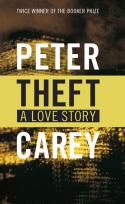
I finished reading Peter Carey's new novel Theft at the weekend. It's good. It's a novel told in two compelling voices, that of the Australian painter Butcher Bones, who has fallen on hard times both personally and professionally (an acrimonious divorce and a heavy crash from a position of fame and acclaim), and that of his brother Hugh (for whom, by the way, I've just spent five minutes googling to find the current politically correct description. In the novel he's described just as "damaged", and the rich, strange, vulnerable logic of the voice given to him by Carey paints the rest of the picture brilliantly, but in the real world I guess he would be described as either suffering from a learning disability or as having special needs. By now there's probably some other way to put it. But you get the message. And he's one of the best and most memorable characters I've come across in a long time).
Anyway, Butcher (real name Michael Boone...the nickname is bestowed on him by his brother, who calls himself Slow Bones) has been pretty much banished to an isolated house in the country, where he spends his time looking after Hugh and not painting, and the tight writing of the first few chapters ably conjures up the resentment and boredom and bitter disappointment of this situation. It's depressing and uncomfortable and it seems as if one brother might kill the other unless something happens to puncture the tension in which they live. That happens with the arrival into their lives one storm-bludgeoned night of Marlene, a young American woman who has been stranded by the rising river while trying to drive to the house of their neighbour. She is the daughter-in-law of Jacques Liebovitz, the painter who was Butcher's greatest influence, and hanging on the wall of their neighbour's house, she reveals, is the priceless original of the very Liebovitz which made Butcher want to become a painter. And immediately afterwards, it's reported stolen, and the Bones boys find themselves carried along on, and soon helping to perpetuate, a complicated and brilliant piece of art fraud. Butcher begins painting again, Marlene keeps producing more surprises, and Hugh keeps thinking and watching and talking to us in his great big innocent-but-cuttingly-sharp voice, all CAPITAL LETTERS and unpleasant truths - a voice as perceptive and staggeringly true and unforgiving as that of a young child. Hugh is no comic relief or compassionate touch - though Marlene has the plans and Butcher has the paints, he has the stark, unfaultable logic which becomes, oddly but convincingly, the book's driving intelligence. Butcher keeps saying he can't go anywhere, do anything, take on anything, because he needs to be with Hugh. By the end of the book, we see why. Yes, Hugh is his responsibility - but he's also, in a sense, his eyes.
This book has only, so far, been released in Carey's native Australia - it'll be published by Faber in the UK next month and by Knopf here in the US this week (as I was informed by a former student of Carey's on the L train two days ago, who was horrified to see me reading an as-yet-unpublished book and demanded to know where I'd gotten it from. Slightly hysterical in his over-protectiveness of his professor, I'd say). But for a book that's yet to be published in most parts of the world, it has already found itself the object of controversy. This is because Carey's ex-wife, Alison Summers, has come out fighting to say that the character of Butcher's ex-wife in the novel is clearly based on her. Because it's not a pleasant portrait of an ex-wife (in the few places where an ex-wife is mentioned), Summers maintains that the novel constitutes a personal attack on her. She’s not the only one who believes this, but obviously her voice is the one with the most authority. She’s “devastated”, she has told journalists, by Carey’s giving to Butcher the phrase “alimony whore” to describe his ex-wife.
Rant below...
Now, cards on the table, first of all: I interviewed Peter Carey today, and we talked mostly about his new book and about his background as a writer, but the comments made by his wife and the publicity arising from them had to be touched on, and so I asked him about the accusations and he said nothing I didn't expect him to say and nothing I couldn't already have guessed. Yes, he's been through a divorce; no, it wasn't pretty, and no, the book is not about that divorce. He's written plenty of memoir-style literature, he pointed out, and if he'd wanted to write about this particular personal experience, that form would have been open to him. The novel is not the place, at least not for him, which was something I thought already blatantly illustrated by the weight and quality of his novels.
We only discussed this for a few minutes, because to be honest I was a little embarrassed to bring it up. I don't think any writer should have to face questions about his or her personal life. A novelist has a publicist to publicise a novel, not a divorce or a marriage or a baby or a retreat to a Namibian resort to have a baby. During an interview with a novelist, the subject of the conversation is very obvious. Often, it's sitting on the table between you, in the shape of the new novel. The subject is the work. I know this attitude is a little puritanistic, especially now that every single editor out there, no matter how "serious" the publication, is eager for copy with an element of lifestyle journalism to it. And it can really enrich a reading experience (at least, the experience of reading an interview) to know something about the novelist's house, or children, or his partner...and I have really enjoyed hearing about those things from writers I've interviewed. But to go rooting for these subjects, especially when they've become even more intensely private than they already were, because of divorce or loss or other bad experiences, is, I think, to debase the readings experience somewhat. See, I told you I was puritanistic about this. HIt me with reasons why I shouldn't be, if you have a view on this.
As for the verdict of one “friend” of Summers, that Carey has “trashed the ex-wife to clear the way for a popular welcome for his new partner”, Frances Coady…please. This is not Plum bloody Sykeswe’re talking about here. This is an author who has now published nine deeply original, intensely intelligent novels the range and strangeness and diversity of which is testimony to the strength of the literary imagination. He writes and researches for three solid years, working every day, until a novel is finished. He has won the Booker Prize twice. Of course, winning the Booker twice and spending a long time on a novel are not by themselves proof of the argument that a novelist has higher and more serious motives in writing a novel than “clearing the way” (what does that even mean?! Clearing the way with whom? Frances Coady is a very established publisher, formerly with Granta and now at Picador, and I doubt that she needs any way cleared for her on either side of the Atlantic at this stage. It's a petty and really quite dim assertion) for his new girlfriend, but anyone who has read any of Carey’s previous novels, and who reads this one, will see the fatuousness of this “friend’s” claim. This is not writing which has been created to impart a short and sharp shock, to make a point, to serve a low purpose quickly and crudely. It is careful, deeply-thought and felt, considered. It’s not pious or reverent, either -Theft, like My Life as a Fake is bitterly funny, sometimes disturbing, and ruthlessly frank. Butcher is no hero, no victim, no righteous ex-husband, but an unattractive man, flawed and quite stupid, but delivered with Carey’s typical compassion. Compassion is not the same as bias, which is the only motive or relationship with a character which could drive a novelist to write the sort of novel of which Carey is so ridiculously accused.
I think that Summers’ decision to go public on her unhappiness about the novel is ill-advised, and I think that she has talked too easily to an all-too-eager press without having any credible evidence for her argument. I have no doubt but that she is genuinely smarting from this episode, but then any divorceé reading the first novel produced by their ex after their divorce is bound to scrutinise it for references to marriage, divorce, love and sex. And there’s a good chance that such a person – who is, essentially, vulnerable – will find in such a novel exactly what they want to find, see what they want to see. In other words, they will project. And wow, does Summers seem to be projecting. She seems convinced, too, that everybody else will read the novel and see not Butcher or Hugh or Marlene, but her, and that nobody will talk about Carey’s writing or about the artistry or otherwise of the novel, but about her: There is an audience over here in New York that has heard some of this from him before so you may think, 'Why is she dreading it so much?' Well, it might have been the gossip over here, but that has not been the case in Australia and Britain, so when the book comes out there is a whole other audience that didn't know what Peter had to say about. Then there are people like my children's teachers, neighbours. It is the fact that this is going to be out there in a much more widespread way, rather than through word of mouth, and none of it is true. When he said things in court papers I had a chance to refute it, but in this case I don't. And it's there for ever. I'm the mother of his children and it is there for them to see, their friends and my grandchildren. It is fixed in literary history.
But this is ludicrous. Why? Simply because the ex-wife is so slight and occasional a character in Theft as to be hardly noticeable. She’s mentioned maybe five times, and she is only seen as a face at a window in a scene which is not about her, but about Butcher’s paintings. I’m in no position to say whether or not she bears any resemblance to Summers, because obviously I have no personal knowledge, apart from what’s known about Summers from her own words in the paper, which would allow me to make that judgement, but here are two points. Firstly, she does not match up to that picture Summer gives of herself in any way. She does not live in NY. She is not a theatre director. She is not bringing up two teenage sons. She is not writing a novel (as is Summers, which may be the whole driving force, conscious or unconscious, behind this whole sorry fuss...is it just me, or is there a hopeless irony to the situation of Summers' complaining about the implications for her of a peripheral portrait of an ex-wife in Carey's novel while she, herself, is writing a novel titled Mrs Jekyll??). Secondly, and more importantly, she is so minuscule a part of this novel, so briefly and minutely glimpsed, that she cannot validly be said to bear a resemblance to anybody. She is dealt with in a matter of a few words, spread over the course of a long novel – she is not a character sketched in any depth, she is given little if any dialogue, she is not described physically in any memorable or startling way. This is not a criticism of Carey’s work; he has chosen to leave this character in the shadows for a valid reason. That reason being that this is not a novel about Butcher’s ex-wife. This is a novel about Butcher. And yes, it is a novel which deals in themes of sadness, disappointment, resentment, loneliness, fear, heartbreak, deception, betrayal, trust….but that these are themes which are also a feature of a divorce, and possibly of the Carey/Summers divorce, does not mean that this is a novel about divorce, or about a divorce. It is a novel which deals in the complexities of being human and being alone – and yes, being angry – but Butcher is alone and angry in a much more fundamental, much more existential, and thus much more interesting way than if these feelings were merely the offshoots of a recent separation.
Meanwhile, the comparisons between Carey and Butcher Bones pointed out by Anthony Barnes in his article for the Independent may be “inescapable”, but they are also pretty minor: Its central character, Butcher Bones, is an artist born the same year and in the same town outside Melbourne, Australia. Their careers have taken them to Sydney, Tokyo and New York, but perhaps more crucially both have recently emerged from bitter divorces.
Barnes doesn’t point out that the novel is set in the early 1980s, ten years before Carey relocated to NY, where he has lived for the past 16 years. Carey’s trip to Toyko, meanwhile, was undertaken with his teenage son two years ago, to write an article for National Geographic, and produced a book which is as much about father/son dynamics as it is about manga and anime culture. When Butcher goes to Toyko, it is to see his paintings exhibited in a department store and to realise the extent of his lover’s trickery. And in Australia, while Butcher and Hugh grow up in the same town as did Carey, during the same years, there is nothing of the middle-class home in which Carey was born, the car-dealer parents, the boarding school at age ten. They are “raised in sawdust”, the children of a butcher, knee-deep all through their childhood in the blood of cattle. After his divorce from Summers, Carey did not go to prison for attempting to seize his own assets – what would he seize, copies of his novels? Manuscripts? – and he does not spend his days caring for a “damaged” brother. There are no similarities worth thinking about.
But that’s the problem. What’s “worth thinking about”, that is. Some readers prefer to think about, and to read for, similarities rather than for good writing, powerful imagery, rich language, skilful characterization. To dig for autobiography is to limit readings, to set out from a premise that is misguided because it refuses, from the outset, to appreciate that the work that an author does with autobiographical fact – the work of shading, reshaping, combining, elaborating, inventing, erasing – is the work that often lends to that novelist’s characters the complexity and richness which makes them characters rather than clichés or cardboard print-outs of life. Sometimes the argument for autobiographical resonances in literature does exist, of course, and sometimes it is a strong one. But in this case, I think, it’s a case of paper needing ink, just as much as of Summers' still-raw anger seeking a new outlet.
Posted by
hesitant hack
at
3:05 PM
101
comments
![]()

